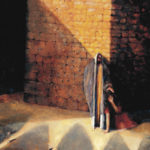We run our website the way we wished the whole internet worked: we provide high quality original content with no ads. We are funded solely by your direct support. Please consider supporting this project.

God’s Kind of Warfare
Over and over, and in a variety of different ways, we are told that, while “[s]ome trust in chariots and some in horses,” Israelites were to “trust in the name of the LORD our God” (Ps 20:7), for “[n]o king is saved by the size of his army” and “no warrior escapes by his great strength.” Yet, “the eyes of the LORD are on those who fear him” and whose “hope is in his unfailing love” to “deliver them from death” (Ps 33:16-9). And while Yahweh frequently promised the Israelites they would be blessed if they placed their complete trust in him, he just as frequently warned them that there would be terrible consequences if they placed their trust in anything or anyone else (see Isa 31:1, Ezek 33:26; Hos 10:13).
Passages like these suggest that, had the Israelites been able and willing to trust Yahweh to “fight” their battles, they never would have needed to lift a sword. Unfortunately, while the Israelites had no problem trusting Yahweh to help them use their swords to conquer enemies, they had great trouble trusting Yahweh instead of their swords. As Vern Eller has pointed out, the one thing the ancient Israelites seemed incapable of understanding was that “MAN IS NOT THE ENEMY” (see Eph 6:12). While everybody in the ancient world trusted their god to help them fight, no one ever dreamed that their god didn’t want them to fight in the first place! And this included what most Israelites expected of Yahweh.
We catch a glimpse of the kind of warfare Yahweh would have liked his people to use in the remarkable story of Elisha’s victory over the Arameans in 2 Kings 6. Elisha’s prophetic gift had enabled him to help the Israelites avoid being ambushed by the Arameans several times. Frustrated by this, the king of Aram sent his army to capture Elisha (vv. 13-4). When Elisha and his servant saw that they were surrounded, the servant was understandably terrified. But Elisha prayed for his eyes to be opened, at which point the servant saw “the hills full of horses and chariots of fire all around Elisha,” referring, of course, to the army of heavenly warriors that were on their side (v.17).
At Elisha’s beckoning, the Lord temporally blinded the Aramean army, at which point Elisha volunteered to lead them “to the man you are looking for” (vv.18-9). When the Lord restored their sight, this army found themselves in the court of the Israelite king. The Israelite king suggested that they take advantage of this fortunate opportunity and slaughter the Arameans. But, to everyone’s surprise, Elisha instead instructed the king to throw them a banquet and send them back home (v. 22)!
Now that looks like the way Jesus would fight. It also looks completely unlike the way any other army (or any other in the history of warfare for that matter) ever fought. Elisha’s decision to “not repay evil with evil” but to instead “overcome evil with good” (Rom 12:17, 21) inspired Aram to bring their military campaign against Israel to a complete and permanent halt (2 Kg 6:23).
How might the Spirit of God be leading you to respond to evil with good today?
—Adapted from Cross Vision, pages 112-114
Category: General
Tags: Crucifixion of the Warrior God, Cruciform Theology
Verse: 2 Kings 6
Related Reading

Jesus Refuted Old Testament Laws
Although it’s clear that Jesus regarded the Old Testament as the inspired word of God, he also directly challenged aspects of the Old Testament law. To illustrate, Jesus was repudiating Sabbath law when he defended his disciples’ harvesting of food on the Sabbath (Mt 12:1-14; cf. Ex. 34:21). Some scholars argue that the disciples were…

Who Curses the Earth?
After the “fall” of Adam and Eve in the Garden of Eden, their sin results in a five curses: on nature, on marriage, on human life, on the serpent, and on women during childbirth. Who is it exactly that afflicts the world with these curses? While the author speaks about the curses on nature (Gen…

Reviewing the Reviews: Tom Belt (Part 1)
Tom Belt has written a four-part review of Crucifixion of the Warrior God on his blog An Open Orthodoxy. Parts 1 and 2 offer an overall fair and balanced summary of CWG, at least to the point that correcting misunderstandings would feel petty. In Part 3 Tom offers a critique of volume I, and this is what I’d like…

The Image of Cross-Like Love: God’s Self-Portrait, Part 6
In the previous blog I argued that God is cross-like love. In this blog I’d like to take this a step further by demonstrating why the cross alone could function as the definitive revelation of God’s true character and by showing how this revelation weaves together everything Jesus was about. If you want to know…

How NOT To Be Christ-Centered: A Review of God With Us – Part IV
In the first three parts of this review of Scott Oliphint’s God with Us we’ve outline his attempt to reframe all God’s accommodations in Scripture in light of the Chalecedonian Creed. He, in essence, uses the mysterious union of God and humanity in Christ to justify asserting that the immutable God can really become mutable…

Crucifying Transcendence
The classical view of God’s transcendence in theology is in large borrowed from a major strand within Hellenistic philosophy. In sharp contrast to ancient Israelites, whose conception of God was entirely based on their experience of God acting dynamically and in self-revelatory ways in history, the concept of God at work in ancient Greek philosophy…
